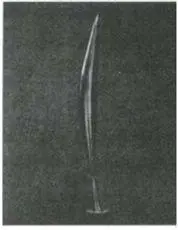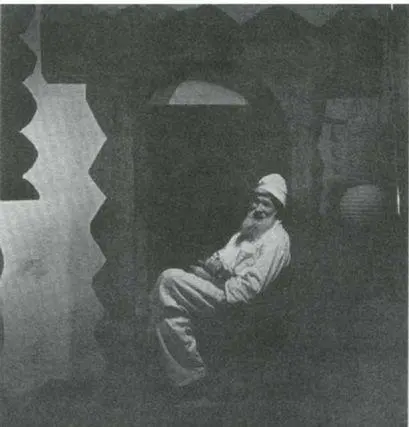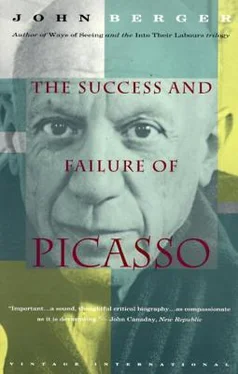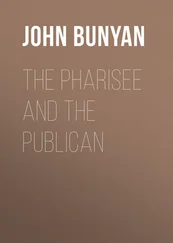
72 Brancusi. The Bird. 1915

73 Brancusi in his studio, 1946
It is true that Picasso has likewise preserved his independence, but he has also been able to cooperate. His commercial success is a token of this cooperation. So also are the films he appears in, the photographs he has posed for, the interviews he has given. However innocent his art, his career bears all the marks of a very shrewd business mind which has the measure of the modern world.
This is not to suggest that Picasso is hypocritical. Nor is it to suggest that, because of his success, he is a less serious artist than Brancusi. We must rid ourselves of the romantic idea that worldly failure is in itself a virtue. In itself it is just an unhappiness. Picasso has a different temperament from Brancusi, and his temperament has enabled him to preserve his genius and be successful.
Yet to explain it like that in terms of temperament is to beg the question. Temperament is simply a convenient term for explaining away what a man is. The temperament must be analysed. This can be done physiologically and psychologically by direct examination. It can also be done — and this has so far been my purpose in this essay — historically.
A temperament is partly the result of social conditioning. But writers have not paid enough attention to the way history can be subjectively active in the creation of a character. I say subjectively because I am not talking about the direct effect of historic events or trends, but about the historical content residing in particular character-traits, habits, emotional attitudes, beliefs: and how this content, which may be highly inconsistent in objective terms, then expresses itself through the formation of a specific character. In common speech the truth of this is recognized when outstanding cases are being considered: ‘He is ahead of his time’, ‘He belongs to another period’, ‘He should have been born during the Renaissance’, etc. But in fact the same applies to every character. The whole of history is part of the reality which consciousness reflects. But a character, a temperament, is maintained by emphasizing certain aspects of reality — and therefore of history — at the expense of others.
The subject is too distant for us to pursue. In relation to the arts, it is far more directly concerned with the novel than with painting. (All great novels are histories of mankind for this reason.) The only point I want to make here is that certain temperaments and their experiences can be most easily understood if defined in historical terms. The precision of the understanding then depends upon the precision of the terms used. I believe that this applies to Picasso.
We have already said that Picasso was an invader. This is what he was in relation to Europe. But within himself he was, at one and the same time, a ‘noble savage’ and a bourgeois ‘revolutionary’. And within himself the latter has idealized the former.
Why has he idealized himself? Or, to put it more accurately, why has he so carefully preserved the primitive bias of his genius that it can serve as the genius of a ‘noble savage’? It has not been the result of self-love or vanity. By idealizing his ‘noble savage’, he condemns, like Rousseau, the society around him. This is the source of his sincere conviction that he has been a revolutionary all his life. It is this which has made him feel a revolutionary — although in fact few Europeans of his generation have had less real contact with modern politics.
If he had returned to Spain, he would doubtless have developed differently. In Spain he would no longer have been aware of himself as a ‘savage’. This awareness was the result of the difference between himself and his foreign surroundings. For others this difference has made Picasso exotic, and to some degree he has encouraged this, for the more exotic he becomes the more of the ‘noble savage’ he can find within himself, and the more of the ‘noble savage’ he can find within himself the more forcefully he can condemn those who patronize him by considering him exotic. Such is the paradox in Picasso’s attitude to fame.
The fact that another part of Picasso is a bourgeois ‘revolutionary’ is equally plausible. He came from a middle class which had not yet achieved its revolution. As a student in Barcelona and Madrid he mixed with other middle-class intellectuals with anarchist ideas. Anarchism was the one political doctrine of the second half of the nineteenth century which continued the eighteenth-century tradition of Rousseau — believing in the essential goodness and simplicity of man before he was corrupted by institutions. After he left Spain, Picasso took no further part in politics for thirty years. At the same time his life was comparatively unaffected by political events. For many of his contemporaries the First World War was a terrible awakening to the realities of the twentieth century. Picasso was not in the war and appears to have given it no thought. His interest in politics was only re-awakened by what happened distantly in his own country during the Spanish Civil War. In so far as he belongs to politics, Picasso belongs to Spanish politics. And in Spain a bourgeois revolutionary is still a possibility.
We can now begin to understand why Picasso claims, like no other twentieth-century artist, that what he is is more important than what he does. It is the existence of the ‘noble savage’, not his products, that offers the challenge to society.
We can begin to understand something of the magnetism of his personality, of his power to attract allegiance. This is the result of his own self-confidence. Other twentieth-century artists have been victims of doubt, awaiting the judgement of history. Picasso, like Napoleon or Joan of Arc, believes that he is possessed by history — that he is the judgement for which others have been waiting.
We can begin to understand his ceaseless productivity. No other artist has had such an output. Although what he is is more important than what he does, it is only by working that his two selves can be maintained. In modern Europe art is the only activity in which the ‘noble savage’ can be himself. Thus the ‘noble savage’ has to paint in order to live. If he did not live, the ‘revolutionary’ would have nothing to live for. He does not go on painting to make his paintings better — indeed he resolutely denies the very idea of such ‘progress’; he goes on painting in order to prove that he is still what he was before.
On a more objective plane the phenomenon of his success becomes more understandable. His success, as we saw, has little to do with his work. It is the result of the idea of genius which he provokes. This is acceptable because it is familiar, because it belongs to the early nineteenth century, to Romanticism, and to the revolutions which, safely over, are now universally admired. The image of his genius is wild, iconoclastic, extreme, insatiable, free. In this respect he is comparable with Berlioz or Garibaldi or Victor Hugo. In the guise of such genius he has already appeared in hundreds of books and stories for a century or more. Even the fact that he or his work is outrageous or shocking, is part of the legend and therefore part of what makes him acceptable. It would be wrong to suggest that each century has its exclusive type of genius. But the typical genius of the twentieth century, whether you think of Lenin or Brecht or Bartok, is a very different kind of man. He needs to be almost anonymous: he is quiet, consistent, controlled, and very conscious of the power of the forces outside himself. He is almost the exact opposite of Picasso.
Читать дальше














